Learning Life’s Family Diplomats
We will be gradually adding below new profiles of Learning Life family diplomats (FDs) across the world. FDs are volunteers committed to learning about citizen diplomacy, global family patterns, trends and issues, and communication skills like storytelling in order to advocate effectively for their family and other families like theirs. Learn a little about each of our FDs below, about Learning Life’s Family Diplomacy Initiative here, and how you can join our growing corps of international family diplomats here. Note: All family members in the photos below are referenced in relation to the FD (FD’s brother, mother, etc.).
Chirunim Agi-Otto (Port Harcourt, Nigeria)
 Family members (from left to right): Chirunim (FD), Obuoma (sister), Dr. Obodoegbulam (father), Dr. Nneka Queen (mother), Fortune (sister), Etuoma (brother).
Family members (from left to right): Chirunim (FD), Obuoma (sister), Dr. Obodoegbulam (father), Dr. Nneka Queen (mother), Fortune (sister), Etuoma (brother).
Please share something interesting about your family: We are a family of educators. My Dad is a senior lecturer in the Department of Religious and Cultural Studies at Ignatius Ajuru University of Education, Port-Harcourt, Nigeria, and my Mum is an English language teacher employed with the Rivers State Government. She earned her Ph.D. in May 2022.
What issue(s) are you passionate about that affect your family? I’m passionate about the financial situation affecting both my family and millions of other families in Nigeria. Inflation and devaluation of our currency, the Naira, is eating up savings in the bank. The prices of basic services like food and transportation are rising, and this is affecting our budgetary allocation. We now sacrifice leisure and enjoyment to pay for absolute necessities. Hopefully, I can help solve this problem through emerging financial technology.
Aaron Akomea (Spintex Batsona, Accra, Ghana)
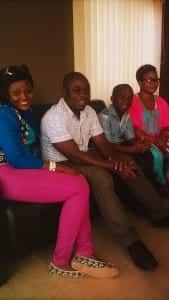 Family members (from left to right): Vivian (daughter), Aaron (FD), Mitchel (son), Doris (ex-wife).
Family members (from left to right): Vivian (daughter), Aaron (FD), Mitchel (son), Doris (ex-wife).
Please share something interesting about your family: I am a multi-ethnic person. Although I have never met my paternal grandparents, the influence of my maternal grandparents and my own parents was enough to groom me to be a responsible man. We inherited rich cultural values and history, living together as a family even into adulthood. In our society, every child is everyone’s child. We are playmates when we are at our best. No one is a senior. We share moments of humor and that is the bond between us.
What issue(s) are you passionate about that affect your family? As a FD, I am very passionate about family unity and cohesion. But in our part of the world, poverty can disorganize a very united family. Also, adoption of global trends, like electronic gadgets, smarts phones, and other things that take away our time, have negatively affected our family values and disintegrated many happy families. I hope we can do something about it since we have all seen the effects of a weak family system.
Tenille Archie (San Fernando, Trinidad & Tobago)
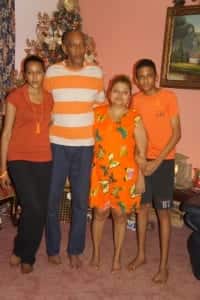 Family members (from left to right): Tenillle (FD), Anthony (father), Judy (mother), Joshua (brother).
Family members (from left to right): Tenillle (FD), Anthony (father), Judy (mother), Joshua (brother).
Please share something interesting about your family: What I find amazing about my family is how much we appreciate and celebrate each other. Only three of my family members are featured in this picture but my aunts, uncles, and cousins are my neighbors (17 of us in total). We celebrate every birthday, achievement, and promotion. My family enjoys spending quality time with each other playing board games, cooking, sharing a meal, studying, and storytelling. We have a Christmas tradition of opening gifts on Christmas Eve. We play Christmas music, make a big pot of hot cocoa, and have Christmas Eve dinner. My family is A-mazing! On Christmas Day, after breakfast, my mom, dad, uncles and aunts play a board game, and all cousins get together (7 of us) to play charades and Monopoly.
What issue(s) are you passionate about that affect your family? I am passionate about recreating the emotionally and psychologically stable, strong environment that my family provided. Over the years, I have met many people that I believe lacked the inner strength and steadfastness that I developed from my family. For this reason, my family and I take quality time with each other seriously. We understand that every individual is at a different stage of growth and development. The activities we participate in together are fun but also teachable moments. My family ensures that while we function well and make decisions as a unit, we can also function and make core decisions well as individuals, that we are strong-minded, self-sufficient, and anchored.
Gustavo Carvajal (San Jose, Costa Rica)
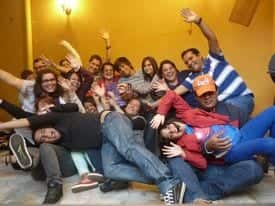 Family members (from left to right): Santiago (nephew), Andrea (cousin), Gustavo (FD), Laura (sister), Roxana (mom), Karen (sister), Miriam (grandmother), Nicole (cousin), Miriam (aunt), Erick (cousin), Heidi (aunt), Motserrat (cousin), and Roger (uncle).
Family members (from left to right): Santiago (nephew), Andrea (cousin), Gustavo (FD), Laura (sister), Roxana (mom), Karen (sister), Miriam (grandmother), Nicole (cousin), Miriam (aunt), Erick (cousin), Heidi (aunt), Motserrat (cousin), and Roger (uncle).
Please share something interesting about your family: My immediate family is really small. It is just me, my two sisters, my mom, and my dad. As a small family, we are able to engage more with our extended family. It has been really difficult at many levels because we are really close, and I am here in America and absolutely everyone else in my family is in Costa Rica. There have been many casualties in my family in the past years for a variety of reasons, but overall, I am so grateful for my family. We love to laugh, eat, and get together for any reason, every birthday, every holiday. We love to share and be creative, like making up disguises for fun.
What issue(s) are you passionate about that affect your family? Breast cancer is one of the main issues that affects my family. There are many women in my family, and there have been many cases of breast cancer which have resulted in many deaths. My mother, my aunts, and my grandmother have all gone through chemotherapy because of breast cancer. Conservatism is another major issue affecting my family. Costa Rica is highly conservative, and any progressive policies will be pushed back, which presents a major problem. This affects employment opportunities, education, and poverty. Any new possibilities for people of humble backgrounds to succeed in Costa Rica will not be possible. If you grow up poor in Costa Rica, you will stay poor.
Ittie Chaunzar (Harare, Zimbabwe)
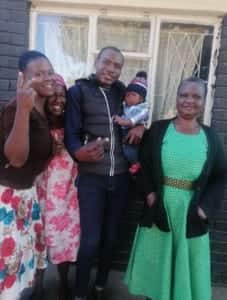 Family members (from left to right): Veronica (sister), Tracy (aunt), Ittie (FD), Shayne (nephew), Rosemary (aunt).
Family members (from left to right): Veronica (sister), Tracy (aunt), Ittie (FD), Shayne (nephew), Rosemary (aunt).
Please share something interesting about your family: We are a very small family with two fathers: my dad and his brother. Even though my father died, we are still united as a family. We come from rural areas, and due to a lack of resources, we were unable to move into urban areas. Growing up in rural areas just made us strong. Even now we are working to improve our standards of living in the rural areas, not to say that we would not want to visit and stay in the cities occasionally. My family and I are united in pushing my siblings to succeed in life. This unity has enabled us to ignore normal family problems that can lead to separation if the family members lack ambition.
What issue(s) are you passionate about that affect your family? I am passionate about working hard since my achievements have only brought joy to my family. It is my goal to do all I can to pitch in on the living expenses as soon as I can since my father passed away. One of my responsibilities I am passionate about is being a role model to my family and my community. I have always felt that my father toughened me up to be up for the task. Wherever I may be, I’m always thinking about how to make our lives better as a family, and the first problem to tackle is the shortage of money for our needs.
Atenkeng Cynthia (Buea, Cameroon)
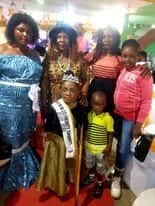 Family members (from left to right): Back row: Atama Hostine (aunt), Fuanyi Patricia (mother), Nkafu Sonia (sister), Nkezia Angel (daughter). Front row: Atenkeng (FD), Atabong Princeley (nephew).
Family members (from left to right): Back row: Atama Hostine (aunt), Fuanyi Patricia (mother), Nkafu Sonia (sister), Nkezia Angel (daughter). Front row: Atenkeng (FD), Atabong Princeley (nephew).
Please share something interesting about your family: I am from a small, Christian family. It is just my mother and four siblings. I was the last child born, and I am also the only disabled one. We live in a small town in one of the cities in Cameroon. My family is very poor. My father was disabled, and he passed away when I was still in secondary school. Nobody in my family has ever had the opportunity to attend a good school, but even so, we are happy.
What issue(s) are you passionate about that affect your family? I am passionate about how disability affects families. My family is very poor, and we have received little help from our community. We have also faced rejection from the members of my extended family on account of my disability.
Quan Chao “Marvin” Fan (Xinxiang, Henan, China)
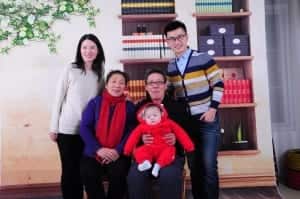 Family members (from left to right): Jiali (ex-wife), Fengrong (mother), Yuwen (son), Xingming (father), Marvin (FD).
Family members (from left to right): Jiali (ex-wife), Fengrong (mother), Yuwen (son), Xingming (father), Marvin (FD).
Please share something interesting about your family: I come from a very traditional Chinese family, which means we value family more than anything else. My parents did their best to make sure I have the best education they can offer me. And they live with and take care of their old mothers who are 87 and 94 years old (the fathers both passed away). I grew up in a period when China was developing and changing amazingly fast. All the clothes I had ever worn before 13 years old were hand made by my mom. My mom bought me my first pair of jean pants to congratulate me for getting into a good middle school when I was 13. I never travel out of my city before I was 15 years old. Going out to eat was never an option for my family before I was 18 years old. We always cooked and ate at home before I went to college. We could not afford to buy clothes, travel or go out to eat back then. However, as China’s economy developed, the income and living conditions of our family have really improved. Now we can do all these things more easily. However, we still eat at home most of the time for healthier meals.
What issue(s) are you passionate about that affect your family? Two issues: health and education. On health, my father’s mom is 94 and my mother’s mom is 87. My parents are both in their early 60s. We want to make sure they stay healthy mentally, physically and emotionally, especially given the Covid pandemic. Same thing with my four-year-old son, who is living with my mom now. We want to make sure he grows up with good health. On education, my family values education a lot. They are all life-long learners. My parents read books every day. They support me to pursue my Ph.D. and become a caring world citizen. We also want to help my son grow up with a quality education so he can understand the world and himself more deeply and comprehensively.
Mulbah Isaac Flomo (Caldwell, Montserrado County, Liberia)
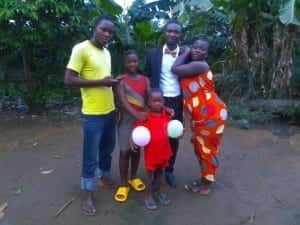 Family members (from left to right): Weekly (brother), Helena (niece), Favor (Weekly’s son), Mulbah (FD), Meme (Weekly’s girlfriend).
Family members (from left to right): Weekly (brother), Helena (niece), Favor (Weekly’s son), Mulbah (FD), Meme (Weekly’s girlfriend).Belle Gjeloshi (Albania)
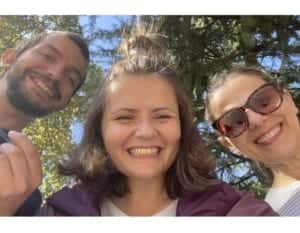 Family members (from left to right): Filip (husband), Belle (FD), Marta (mother).
Family members (from left to right): Filip (husband), Belle (FD), Marta (mother).
Please share something interesting about your family: My mother has been my rock for as long as I can remember. I have very few and scattered childhood memories. I remember hunger and hiding above all. I also remember I had to dress and look like a boy because it was safer to be a boy than a girl. My mother escaped a violent arranged marriage and took me under her wing. Together we left Albania in the midst of civic unrest and spillover of the Yugoslav Wars, and illegally crossed the Adriatic to reach the coastline of Southern Italy. In Italy, we experienced abuse and discrimination because of our origins, something my mother had tried so hard to protect me from. I then moved to the United States for school and work. I’ve lived 13 years in the U.S. now, and to this day it remains the only place that feels truly like home, though I only have a student visa to show for it. A little over two years ago I got married to a man who has shattered all my preconceptions about men and my violent experiences with them up. This year we are expecting our first child. My mother finally gets the chance to be a mom and a grandma-to-be without fear, and I get the privilege to share the rest of my life with them.
What issue(s) are you passionate about that affect your family? I’m passionate about psychological well-being and immigration justice. While this is much of what my research work involves, it has its roots in my experiences from childhood. I’ve lived in four countries and eleven cities. I’ve moved because of conflict, persecution, economic needs, school, and work. I had my mother by my side for half of it, and had to figure it out by myself for the other half. Throughout the years I have grown more resilient in some ways, but I’ve also grown overly tolerant of adversity and feel resilience fatigue. It is thanks to my mother, and, for the past couple of years my husband, that I can reconcile with my past as well as look forward to the future. I hope that both my story and work can further a more humanized approach to immigration as well as promote psycho-emotional support for families, children and adults alike.
Esma Gumberidze (Kutaisi, Georgia)
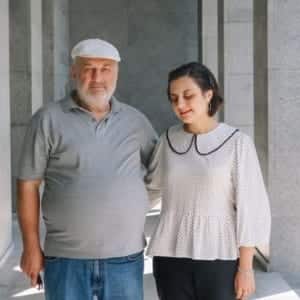 Family members (from left to right): Gocha (father), Esma (FD). Not pictured: Larisa (mother), Ana (grandmother).
Family members (from left to right): Gocha (father), Esma (FD). Not pictured: Larisa (mother), Ana (grandmother).
Please share something interesting about your family: My mom was an elementary school teacher. She worked only for a couple of years before I was born and then really dedicated her life to giving me the education I needed. She moved from her hometown to Soviet Russia in order to avoid making her parents pay for her studies at a local university. It was challenging for her since her professors in Soviet Russia asked how Baltic states like Georgia could ever survive without Russia. My dad, who loved his village so much, he sees it in his dreams almost every night, had to move to the Georgian capital city of Tbilisi and build a house there (building his own house was his dream) because I needed to be educated in a specialized school for the blind. During the Soviet occupation he was sent off to Mongolia to serve the compulsory military term there because he did not bribe the local officials to be assigned to a closer and safer military post. My maternal grandmother is a true survivor who was one of seven children. During the first years after the collapse of the Soviet Union, when her husband died and she was left alone with my mother in an unstable Georgia, she worked at a store under the light of a candle. One of her clients almost killed her when he threw a glass bottle at her because she asked for money for the item he was buying. We also have four cats, whom we adopted from the street, including a blind one. I feel the support of my parents in whatever I do, even when raising my voice against some powerful people and institutions.
What issue(s) are you passionate about that affect your family? My disability determines a lot of how my family lives and what we do. My dad still misses his village. He feels like a refugee in our city. This is the reality of migration, trying to find one’s place in a larger city, and fit in without connections or social capital. As I have had to find my own way, I have found many contacts online that my parents do not have, which sometimes pulls us apart, as if we are living in different worlds. I often struggle to explain to my grandmother what I am doing as an activist raising awareness about disability and other issues. We are so different in my family, but so similar at the same time, so conservative and so liberal.
Marvella & Maria Kavuma (Kampala, Uganda)
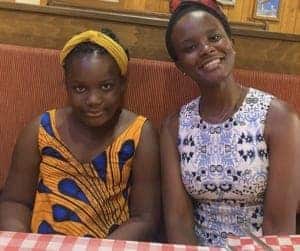 Family members (from left to right): Marvella (FD), Maria(FD). Not pictured: Imani (daughter), Elijah (son), and Maria’s husband.
Family members (from left to right): Marvella (FD), Maria(FD). Not pictured: Imani (daughter), Elijah (son), and Maria’s husband.
Tadiwa Mudede (Harare, Zimbabwe)
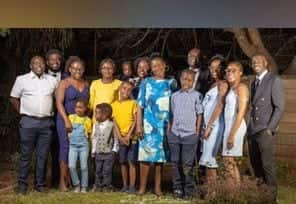 Family members (from left to right): Dennis (brother-in-law), Misheck (brother-in-law), Jane (sister), Loice (sister), Irene (mother), Caroline (sister-in-law), Isabelle (niece), Dennis the first (father), Concelia (sister), Tadiwa (FD), and Kuziwa (brother). The three youngest kids in front are Tisha (niece), Emmanuel (nephew), and Tino (nephew). One of my brothers is not there because he passed away.
Family members (from left to right): Dennis (brother-in-law), Misheck (brother-in-law), Jane (sister), Loice (sister), Irene (mother), Caroline (sister-in-law), Isabelle (niece), Dennis the first (father), Concelia (sister), Tadiwa (FD), and Kuziwa (brother). The three youngest kids in front are Tisha (niece), Emmanuel (nephew), and Tino (nephew). One of my brothers is not there because he passed away.
Please share something interesting about your family: Something about my family that I love is that we are a big family, and we have memories that we have shared that are still stuck in my head even though we are separated. Another thing I value about my family is that we value education. My family drives me to better myself and to always learn more. I’m always trying to better myself for them. I want to be able to provide for my parents, and I want to be able to help provide for future generations; I feel the best way to accomplish this is to further my education and to be more exposed.
What issue(s) are you passionate about that affect your family? I’m passionate about how the death of one family member can cause tension and division in families because everyone wants to blame someone else. My family has been separated since the death of my brother and the picture above is one of the most meaningful pictures I have because it was the last photo of us as a family before we separated. I also want the world to know and be able to accept children with special needs and embrace them as they are. It’s true what people say that “charity begins at home.” If we fail to accept people with disabilities in our own homes as they are, then who out there in the world will?
Jules Nibayemere (Vyanda, Bururi, Burundi)
 Family members (from left to right): Leilla (cousin), Jules (FD), Rose (mother).
Family members (from left to right): Leilla (cousin), Jules (FD), Rose (mother).
Please share something interesting about your family: My family is in a rural area. We live from farming and raising cattle, like cows, sheep and goats. It was one of the sources of income that allowed my mother to pay for my schooling. But as a result of the war and the socio-political conflicts that Burundi has gone through, we cannot currently live from our traditional farming. After graduating in public health in 2018, I struggled to find a job, so I worked as a volunteer at the Rumonge Community Center. In 2021, I found a position in an international organization in the capital of Burundi, Gitega. This job will help me to support my mother in old age.
What issue(s) are you passionate about that affect your family? My family has been affected by unemployment, poverty, political violence, gender inequality, and climate change. In Burundi, political conflicts during elections are the cause of several vulnerabilities for families.
Nusrat Jahan Nipa (Barishal, Bangladesh)
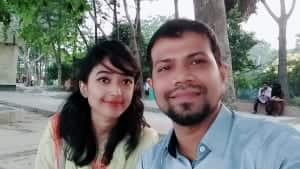 Family members (from left to right): Nusrat (FD), Kazi Shamsuzzaman (husband)
Family members (from left to right): Nusrat (FD), Kazi Shamsuzzaman (husband)
Please share something interesting about your family: My husband’s hobbies are watching movies and gardening. I like to recycle because I am concerned about pollution. I also like developing new skills. In 2021, I broke a Guinness World Record. In mid-2020, during Covid, my office was closed for a few days. I was home browsing social sites, and found a video on YouTube related to making a world record: “the most coins stacked into a tower in one minute.” After practicing for more than 6 months, I attempted to break the world record on September 24, 2021, stacking 71 coins in one minute, and on November 30, Guinness confirmed that I broke the record previously held by an Italian man, who stacked 69 coins. In Bangladesh, before me, only one woman, a table tennis player, was recognized by the Guinness Book of World Records in 2002. In my country, many people believe that after marriage women are not able to do anything like this. They are confined to four walls. So I was trying to prove them wrong and I did it! My husband helped me a lot. He collected all the coins I needed as he is a banker. He also helped me to record the video of me stacking the coins, and gathered witnesses and other requirements to certify the world record. Also, breaking a Guinness World Record requires patience and perseverance, which I learned from my parents.
What issue(s) are you passionate about that affect your family? I am passionate about the environment and climate change. In Bangladesh, we face water pollution and rising temperatures. Dirty water means me and my family often get diseases like skin problems, stomach upset, and diarrhea. This year (2022), already, the majority of the people in Bangladesh, including my husband, have gotten diarrhea. Increasing temperatures cause respiratory diseases, like asthma, and chronic obstructive pulmonary disease (COPD). My mother suffers from severe COPD. The temperature was 41 Celsius (106 Fahrenheit) in April in northern Bangladesh. There is the also the risk of flooding because my city is very near the coast. Higher temperatures bring super cyclones and storms, which directly threaten my parents, who have a single-story house.
Sami Noman (Islamabad, Pakistan)
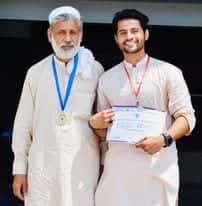 Family members (from left to right): Rehman (father) and Sami (FD). Not included: Sulaiman (brother), Sujjad (brother), Muhmmad Huzaifa (brother), Laiba (sister), and Najma (mother).
Family members (from left to right): Rehman (father) and Sami (FD). Not included: Sulaiman (brother), Sujjad (brother), Muhmmad Huzaifa (brother), Laiba (sister), and Najma (mother).
Please share something interesting about your family: I would say that living in a peaceful family has made us all easygoing and loving toward one other. Our source of finance is my elder brother because he has his own business that supports all of our needs. For example, I’m a student studying journalism and mass communication at Abdul Wali Khan University in Mardan, Pakistan, and all of my school expenses are funded by my elder brother.
What issue(s) are you passionate about that affect your family? I am passionate about climate change, which is causing extreme flooding in Pakistan and other parts of the globe. My family is affected because when a flood happens, business stops. Additionally, educational instabilities occur. That’s what we have been facing recently. Then there’s the issue of the quality of education in Pakistan because governmental schools are not educating their students effectively.
Leroy Quoi (Monrovia, Liberia)
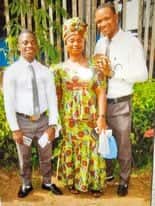 Family members (from left to right): Leroy (FD), Evelyn Zingbay (mother), Uray Banyeah (uncle). Not included: Levi (brother) Josiah (brother), Rachel (sister).
Family members (from left to right): Leroy (FD), Evelyn Zingbay (mother), Uray Banyeah (uncle). Not included: Levi (brother) Josiah (brother), Rachel (sister).
Please share something interesting about your family: My family is extremely different in so many ways. We normally celebrate family members’ birthdays even more than national holidays, and we have fun with our Mom. It’s like she is our sibling. We eat together and even love to dance with our Mom rather than going to the club or entertainment center. My family is a neglected and abandoned family. Neglected because my uncles and aunts do not care about us; they see us like we are nobody. We are abandoned because my Dad refused to support us, feed us, pay for our schooling, visit us, and even speak to us, but, I am glad that I have a mother who is one in a million. She is strong, hard working and always independent. She has made this rejected family (my family) the center and bread winner of both her family and my Dad’s family. She is even sending some of her stepdaughters to school, feeding them and also giving them shelter. My mom is a private school teacher. I am a first-year university student studying General Biology. My little brother Levi is in 10th grade, my other brother Josiah is in 7th grade, and my little sister Rachel is in 3rd grade. I am currently living in the capital city of Liberia with two of my siblings. Another one of my siblings lives with my mom in Nimba County. I am currently sponsoring the two that are with me while my mom is providing them with clothing, food and other materials. I am now helping my mom since I realized that she doesn’t have any helpers.
What issue(s) are you passionate about that affect your family? I am so passionate about single mothers. I have realized that single mothers have some hidden power and caring agenda that they want to accomplish, but this can only be done with the support of their families. Mostly, they feel that the only way to take revenge for what their ex-husbands or boyfriends did to them is to advance themselves academically. They want to succeed so they can proudly walk before their ex-husband or boyfriend. They want to use their brain power instead of muscle power. When women in Liberia and elsewhere leave their husband’s house and return to their parents, they can be treated carelessly, not supported in their new journey, neglected, oppressed, depressed and overlooked. I want to be that voice they need, to speak up for them so they are supported by their family and can impact their family positively.
Mohammad Siavash (Herat, Afghanistan)
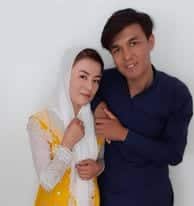 Family members (from left to right): Sherin (wife), Mohammad (FD). Not pictured: Hakima (mother), Ibrahim (father), Namatullah (brother), Rahmat (brother), Najiba (sister), Raihana (sister), Zahra (sister).
Family members (from left to right): Sherin (wife), Mohammad (FD). Not pictured: Hakima (mother), Ibrahim (father), Namatullah (brother), Rahmat (brother), Najiba (sister), Raihana (sister), Zahra (sister).
Please share something interesting about your family: I grew up in a family where no one on my paternal nor maternal sides had much education. One aspect I really love about my parents is their strong beliefs in Allah Almighty and their own lives. My father who motivated and supported me and the whole family was and still is my hero. So is my mom. She advises me all the time on how curious and careful I should be in life. We are all now living together happily and peacefully after years apart. Now I am happy that I can see that one of my brothers has graduated from high school, and my younger sister is in school. I got my BA, and my wife has also got her high school degree. I am sad that my family is in Iran, but my wife is in Afghanistan with her own family. I had to leave Afghanistan because I had been teaching English there and was scared of being captured.
What issue(s) are you passionate about that affect your family? It takes much time to have a wonderful family. Many issues are still affecting our family, like lack of education, and the economy, which doesn’t let us live the life we want. There are also other family issues, like illnesses, jealousy, being angry with each other, and relational problems between parents.
Nishwa Tasavvar (Sargodha, Pakistan)
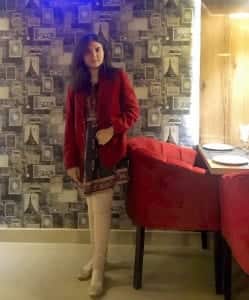 Family members: (Nishwa’s family prefers not to be shown.) Alam (father), Robina (mother), Nahl (sister), Nishwa (FD), Afnan (brother)
Family members: (Nishwa’s family prefers not to be shown.) Alam (father), Robina (mother), Nahl (sister), Nishwa (FD), Afnan (brother)
Please share something interesting about your family: The most interesting fact about my family is that we love to travel. Each year, we explore a new part of Pakistan, usually it’s northern side, but I’ve seen the entire country. Every summer, we spend a month camping in the adventurous areas of Pakistan. This has been a 15-20 years-long family tradition now.
What issue(s) are you passionate about that affect your family? For families, collective problem solving can help solve almost every uncertainty in life. But due to communication gaps, my family does not keep every member on the same page. This leads to intensive miscommunications, so some family members feel left out or ignored.
Chloe Terani (Los Angeles, California, USA / Family from Iran)
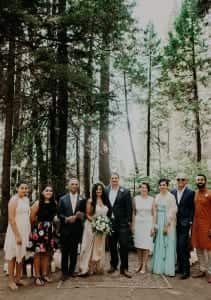 Family members (from left to right): Amelia (sister), Chloe, (FD), Aboo (grandfather), Alexa (aunt), Adam (uncle), Pouri (grandmother), Shadi (mother), Amir (father), Justin (uncle).
Family members (from left to right): Amelia (sister), Chloe, (FD), Aboo (grandfather), Alexa (aunt), Adam (uncle), Pouri (grandmother), Shadi (mother), Amir (father), Justin (uncle).
Please share something interesting about your family: Food is a huge part of my Iranian-American family and our traditions, especially on New Years. During Iranian New Year, or Nowruz, we all come together to make and eat different dishes including “sabzi polo ba mahi,” or fish with herbed rice, and “ash-e reshteh,” a kind of noodle soup. We also set up the Haft-sin, which incorporates items like apples, gold coins, and a mirror to symbolize our values and wishes for the New Year. For example, we place vinegar, or Serkeh, on the table to symbolize patience.
What issue(s) are you passionate about that affect your family? Issues that have heavily affected my family are immigration and health. Though immigration has allowed us to branch out and achieve better opportunities, it has both reconstructed and separated my family. In addition, many of my family members have dealt with immense challenges surrounding health and illness, which has therefore impacted us as a whole. Two family members who I was/am very close with went/have gone through the struggles of kidney failure and transplant. One of them, my father, received what we’ve called a miracle, when he got a second kidney transplant.
Joe Toles (Auburn, Alabama, USA)
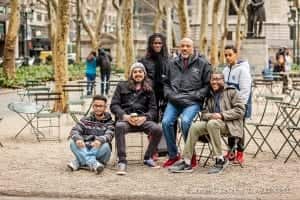 Family members (from left to right): Jhon, Xavier, Creemel, Joe, Kamren, Cinsere. Not in the photo: Johnathan, Ronny, Trenton. Joe is the father, all the rest are his sons.
Family members (from left to right): Jhon, Xavier, Creemel, Joe, Kamren, Cinsere. Not in the photo: Johnathan, Ronny, Trenton. Joe is the father, all the rest are his sons.
Please share something interesting about your family: We are a family of nine men who all grew up in the U.S. foster care system. My youngest adoptees were 13 years old when adopted and my oldest was 20 years and 8 months old. I adopted my first son from foster care in August 2010 and the latest adoption happened on May 12, 2022. I am the only one in the household that has not been adopted.
What issue(s) are you passionate about that affect your family? I am passionate about making sure that every child who needs and wants a family finds one. My family believes that family is the solution to kids in foster care. Secondly, but not any less important, is our belief that all children in foster care should receive the trauma-based support that will help them overcome the issues of being separated from their families and the misdiagnoses (e.g., “problem child” too old to change, or unable to form emotional attachments) that sometimes follow them from foster care.
Justice Umesi Onyekachi (Port Harcourt, Nigeria)
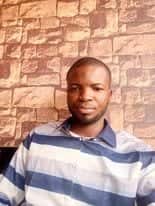 Family members: Anderson (Father), Justina (sister), Peace (sister), Bright (sister), Miracle (sister), Justice (FD). Note: Justice’s family prefers not to be shown.
Family members: Anderson (Father), Justina (sister), Peace (sister), Bright (sister), Miracle (sister), Justice (FD). Note: Justice’s family prefers not to be shown.
Please share something interesting about your family: We are a family of six who all grew up in the south of Nigeria. My mom passed away, leaving me, my Dad, and four of my siblings, though two of my elder sisters are married. The most interesting thing about my family is that we love to unite every festive period, especially Christmas and Easter. Friends, relatives and well wishers far and near come to celebrate with us during festive periods. We make a lot of dishes because my late mom was a chef and she taught my sisters how to prepare many kinds of meals. We value family so much more than anything else. My family invested so much in me and offered me the best education. I attended very notable nursery, primary, secondary, and tertiary schools. I was loved, cherished, and cared for by my family and relatives, especially as the first male child.
What issue(s) are you passionate about that affect your family? My family values education. That’s why they did everything humanly possible to ensure each and every one of my siblings acquired a formal education. My family tries to ensure every even relatives get a formal education, so they can understand our society and the laws guiding it. But this hasn’t been achieved fully because of the economy of Nigeria. Still, my family believes in collective responsibility in tackling challenges. For my family, when a problem is shared, different solutions are brought forward to solve it. But when my mom died, there was a vacuum and a bridge in communication amongst members of the family, because it was my mom who ensured that we were united during festive seasons. After the death of my mom, it was difficult for my family to unite and tackle personal and family problems collectively. This has made it difficult for us to communicate and carry each other.
Luthfianto Yudha (Jember, Indonesia)
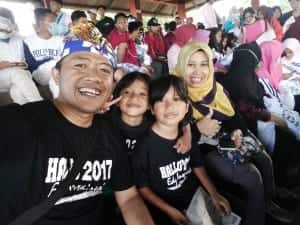 Family members (from left to right): Luthfianto (FD), Balqis (daughter), Daffa (daughter), Nurul (wife).
Family members (from left to right): Luthfianto (FD), Balqis (daughter), Daffa (daughter), Nurul (wife).
Please share something interesting about your family: Every December, we have a family gathering, with about twenty family members all together. Our annual get-togethers usually involve trips. The photo here is of our family trip to Bali. We have been to Jogjakarta, Surabaya, and some more places in Asia. We planned to visit Sumatra, but then the Covid pandemic happened.
What issue(s) are you passionate about that affect your family? Caring and sharing as well as living together as a unity are the things that attract me most. I have always wanted to see my kids grow through our family activities, including getting them involved in family decisions. I believe I can help them grow through the DARe principles: I let them Dream, I accompany them in their Actions, and I help them inspiRe others.

